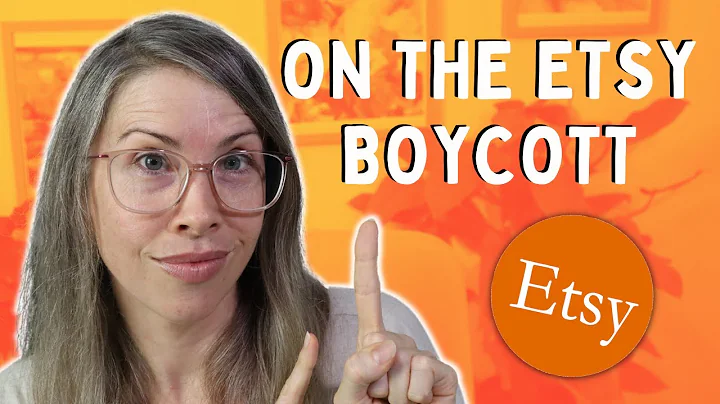Discover Exclusive Etsy Coins for Sale
Table of Contents
- Introduction
- The Rise of Etsy
- The Problem with Etsy's Coin Listings
- Non-Homemade Items
- Mixed Quality of Coins
- Difficulty in Determining Authenticity
- Overpriced Coins
- Why Does Etsy Allow Such Listings?
- Tips for Buyers on Etsy
- Tips for Sellers on Etsy
- Alternatives to Etsy for Buying Coins
- Conclusion
The Problem with Buying Coins on Etsy
Etsy, the popular online marketplace known for its handmade crafts and unique products, has recently become a hot spot for buying and selling coins. However, there are many concerns and issues surrounding the coin listings on Etsy. In this article, we will explore the problems with buying coins on Etsy and discuss why it has become such a controversial topic.
1. Introduction
Etsy was initially created as a platform for artisans and crafters to sell their handmade goods. However, over time, the site has evolved, and now almost anything can be found for sale on Etsy, including coins. While there are certainly reputable sellers and quality listings on Etsy, the coin section has become flooded with questionable offerings.
2. The Rise of Etsy
Etsy's popularity has skyrocketed in recent years, attracting millions of buyers and sellers from around the world. Its user-friendly interface and wide range of products make it an appealing marketplace for both customers and entrepreneurs. However, this rise in popularity has also led to an increase in problematic coin listings.
3. The Problem with Etsy's Coin Listings
3.1 Non-Homemade Items
One of the main issues is that Etsy has allowed non-homemade items to be sold on its platform. This means that coin listings, which were initially intended to showcase unique and handmade items, now include mass-produced coins, estate sales, and even counterfeit coins. This dilutes the original purpose of Etsy and makes it difficult for buyers to trust the authenticity of the coins being sold.
3.2 Mixed Quality of Coins
Another problem is the mixed quality of coins available on Etsy. While there are legitimate sellers who offer genuine and high-quality coins, there are also sellers who list fake or damaged coins at inflated prices. It can be challenging for buyers, especially those with limited knowledge or experience, to differentiate between good and bad coins without extensive research.
3.3 Difficulty in Determining Authenticity
Determining the authenticity of coins listed on Etsy can be a daunting task. With the abundance of fake coins and misleading descriptions, it can be hard for buyers to know if they are getting a genuine coin or a cleverly crafted counterfeit. This lack of transparency and reliability poses a serious risk for buyers, especially those who are not well-versed in numismatics.
3.4 Overpriced Coins
In addition to authenticity concerns, many coins listed on Etsy are also overpriced. Some sellers take advantage of unsuspecting buyers by charging exorbitant prices for coins that may not be worth the asking amount. This pricing discrepancy further adds to the confusion and uncertainty surrounding buying coins on Etsy.
4. Why Does Etsy Allow Such Listings?
The question arises: why does Etsy allow these problematic coin listings to persist? While Etsy has implemented policies and guidelines to regulate the marketplace, the sheer volume of listings makes it challenging to detect and remove problematic items. Additionally, Etsy's decision to broaden its range of products beyond handmade crafts has opened the door for inappropriate coin listings.
5. Tips for Buyers on Etsy
For buyers who still wish to purchase coins on Etsy despite the challenges, there are several tips to keep in mind. Firstly, always research the seller's reputation and read reviews from previous buyers. Look for sellers with a proven track record of offering genuine coins and providing accurate descriptions. Secondly, ask questions and seek clarification on any doubts or concerns before making a purchase. Lastly, trust your instincts and exercise caution when considering high-value or rare coins listed at suspiciously low prices.
6. Tips for Sellers on Etsy
For sellers looking to list coins on Etsy, it is essential to establish credibility and build trust with potential buyers. Provide detailed and accurate descriptions of the coins, including their condition, authenticity, and any relevant certifications. High-quality images that clearly depict the coins can also enhance buyer confidence. Lastly, maintain open communication with buyers and promptly address any issues or inquiries they may have.
7. Alternatives to Etsy for Buying Coins
If the risks and uncertainties associated with buying coins on Etsy are too concerning, there are alternative platforms available. Established numismatic marketplaces, auction sites, and reputable coin dealers can provide a greater level of security and trust when purchasing coins. Research these platforms and consider their reputation and buyer protections before making a decision.
8. Conclusion
In conclusion, buying coins on Etsy can be a risky endeavor due to the proliferation of questionable listings and the difficulty in determining the authenticity and value of the coins. While there are reputable sellers on Etsy, the mixed quality of listings makes it challenging for buyers to make informed decisions. It is crucial for both buyers and sellers to exercise caution and educate themselves to ensure a positive coin buying experience. By following the aforementioned tips and considering alternative platforms, collectors and enthusiasts can protect themselves from potential scams and enjoy a rewarding coin collecting journey.
Highlights:
- Etsy's coin listings have become problematic due to non-homemade items, mixed quality, difficulty in determining authenticity, and overpriced coins.
- The rise in popularity of Etsy has led to a flood of questionable coin listings.
- The inclusion of non-homemade items on Etsy dilutes its original purpose and makes it challenging for buyers to trust the authenticity of the coins.
- Determining the authenticity of coins on Etsy is difficult due to the high number of fake and misleading listings.
- Overpriced coins and pricing discrepancies further complicate the buying experience on Etsy.
- Etsy allows such listings due to the sheer volume of listings and the difficulty in monitoring and regulating the marketplace.
- Buyers should research sellers' reputations, ask questions, and exercise caution when considering high-value or rare coins on Etsy.
- Sellers should provide accurate descriptions, high-quality images, and maintain good communication with buyers on Etsy.
- There are alternative platforms, such as established numismatic marketplaces and reputable coin dealers, for buying coins with greater security and trust.
- Despite the challenges, informed buyers and sellers can still have a positive coin buying experience on Etsy by taking necessary precautions.
FAQ:
Q: Are there any reputable coin sellers on Etsy?
A: Yes, there are reputable sellers on Etsy. However, it is essential for buyers to do their research and read reviews before making a purchase.
Q: Are all coins on Etsy overpriced?
A: Not all coins on Etsy are overpriced. However, there are instances where sellers charge inflated prices for coins that may not be worth the asking amount. Buyers need to exercise caution and compare prices with other marketplaces.
Q: Can I trust the authenticity of coins listed on Etsy?
A: The authenticity of coins listed on Etsy can be difficult to determine. It is crucial for buyers to thoroughly research the seller's reputation and seek appropriate certifications or documentation for the coins they are interested in.
Q: Should I consider alternative platforms for buying coins instead of Etsy?
A: If the risks and uncertainties associated with buying coins on Etsy are concerning, it is advisable to explore alternative platforms that are known for their reliability, such as established numismatic marketplaces, reputable auction sites, or coin dealers.
 WHY YOU SHOULD CHOOSE Etsyshop
WHY YOU SHOULD CHOOSE Etsyshop









